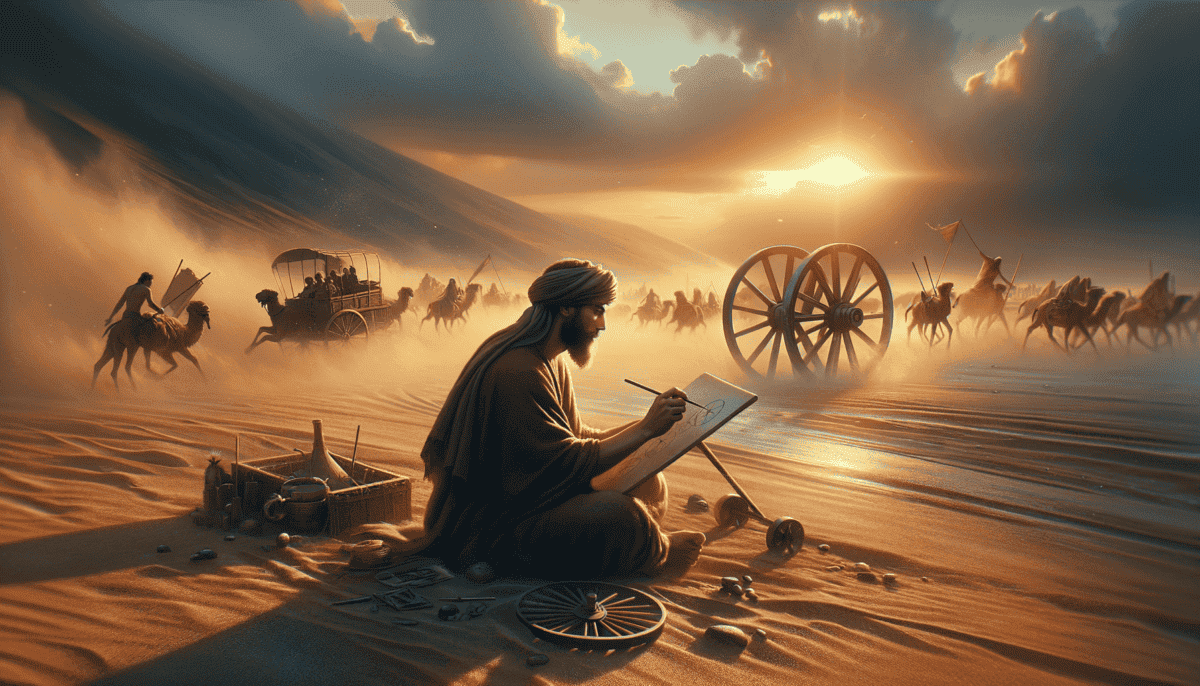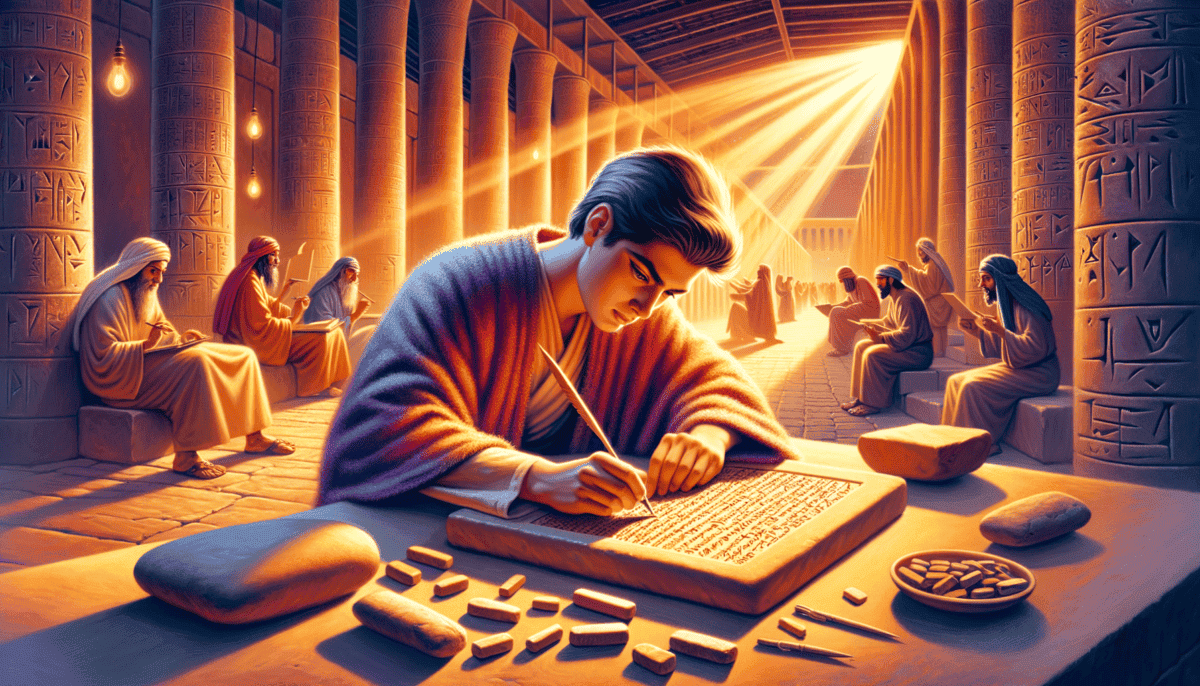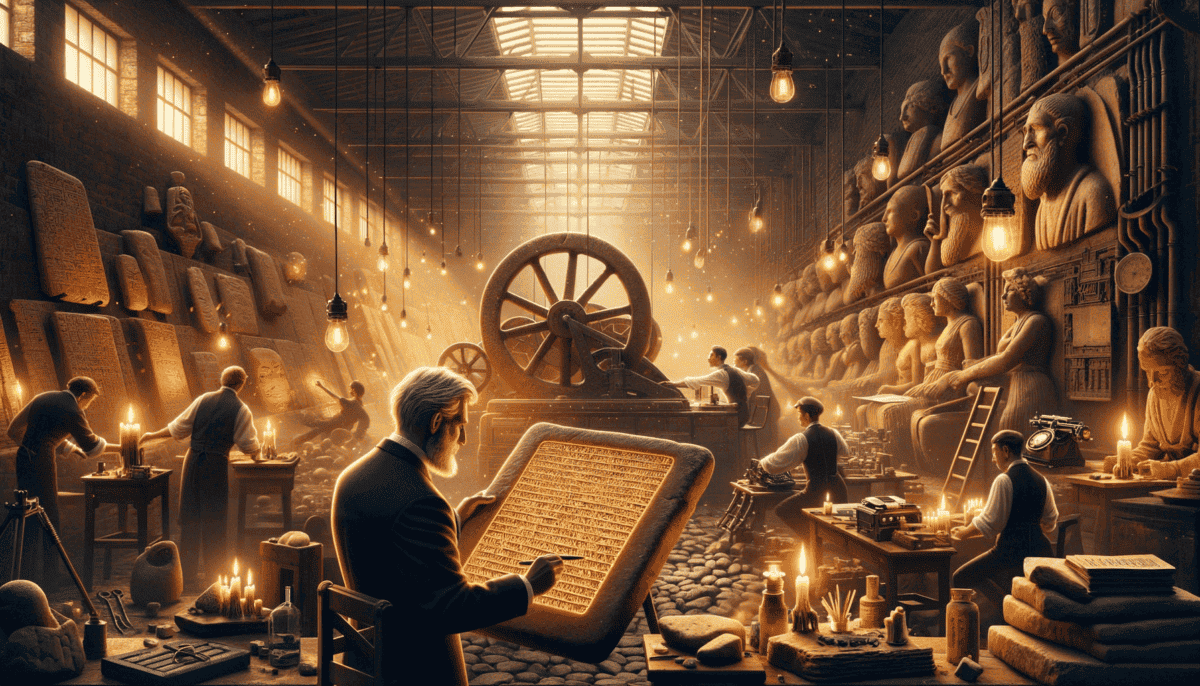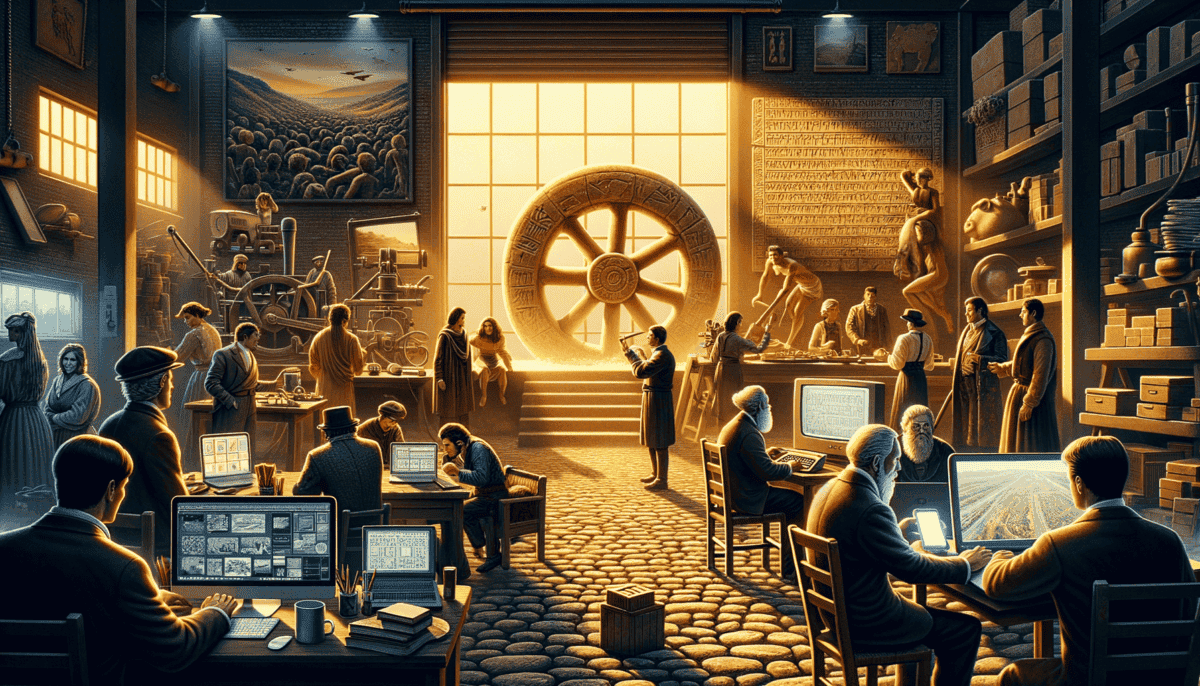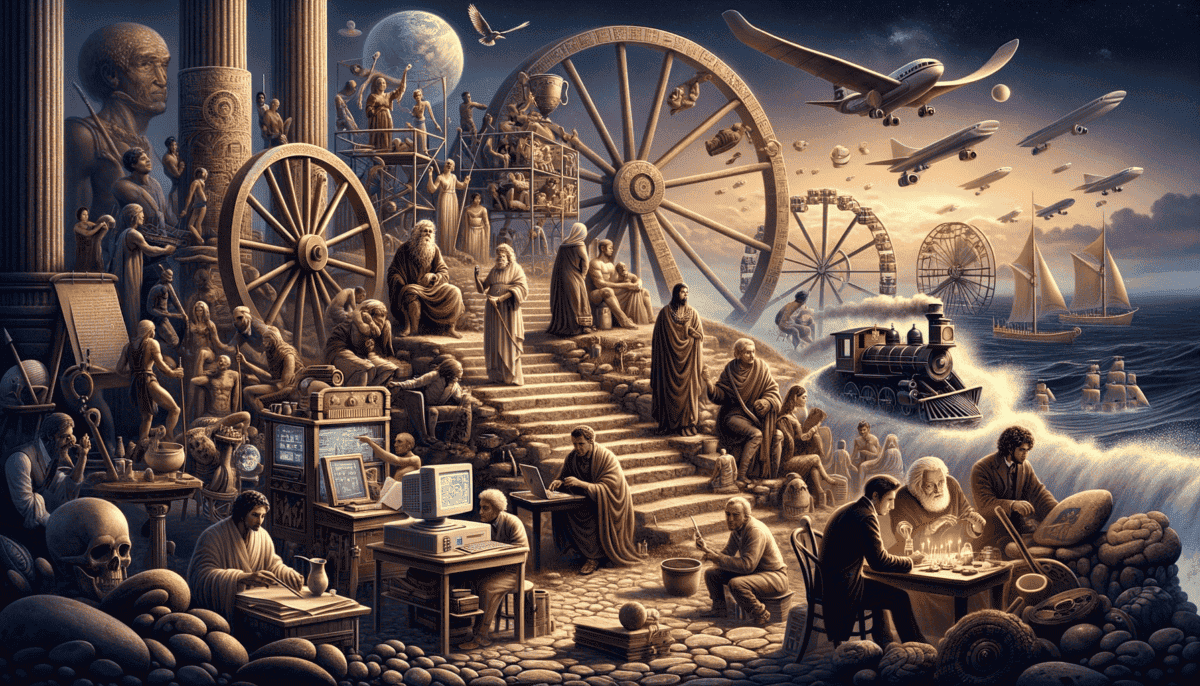The First Spark
The hot sun beat down on young Adad as he watched his father drag another heavy load across the dusty ground. Their village in Mesopotamia needed lots of food and supplies, but moving things was very hard work.
"There must be a better way," Adad said to himself, wiping sweat from his forehead.
Adad loved to solve problems. He would spend hours watching how things moved and worked. One day, while helping his father move some round logs, he noticed something interesting.
"Father, look!" Adad called out excitedly. "The logs roll so easily when we put them under heavy things!"
His father nodded but kept working. "Yes, son. That's why we use them. But we can't always have logs everywhere we go."
But Adad couldn't stop thinking about the rolling logs. That night, while eating dinner with his family, he watched his mother's clay pot spinning on the table. His eyes grew wide with excitement.
"I have an idea!" he shouted, jumping up from his meal.
Adad ran to his favorite spot near the river where he liked to play with clay. He worked all evening, shaping and molding until he had made something new – a round disk with a hole in the middle.
The First Test
The next morning, Adad showed his creation to his father. "Look what I made! If we put a stick through the middle, we can roll things on it!"
His father looked confused. "What good is a round piece of clay?"
"Watch!" Adad said. He put four of his clay disks under a small wooden box and connected them with sticks. When he pushed the box, it rolled forward smoothly!
Word spread quickly through the village. Soon, everyone wanted to see Adad's invention. Some people laughed and said it would never work. But others saw how useful it could be.
A Village Changed
Adad and his father worked together to make bigger, stronger wheels out of wood. They built the first cart in their village. Now they could move heavy things much more easily!
Other families started making their own wheels and carts. Farmers could move more food from their fields. Traders could carry more goods to sell. Everything became easier with wheels.
Years later, Adad had grown up and had children of his own. He smiled as he watched little ones playing with toy carts, rolling them up and down the streets of their busy village.
"You changed everything," his father said one evening, patting Adad's shoulder. "All because you paid attention to rolling logs and spinning pots."
Adad looked around at their village. Carts rolled by loaded with goods. Children played with wheeled toys. Pottery wheels spun, helping artists make beautiful things.
"Sometimes the biggest changes start with the smallest ideas," Adad said. "We just have to keep watching, thinking, and trying new things."
That night, as the sun set over Mesopotamia, Adad wondered what other amazing things people would create in the future. His simple wheel was just the beginning of a long journey of human creativity and invention.
| Before the Wheel | After the Wheel |
|---|---|
| Dragging heavy loads | Rolling loads easily |
| Limited trade | More trade possible |
| Slow travel | Faster travel |
The stars twinkled above as new ideas continued to spark in minds across the ancient world. Each invention would build on the ones before it, just as Adad's wheel had started rolling humanity toward bigger and better things.
Carving Thoughts into Stone
Maya sat cross-legged in the temple courtyard, watching the busy marketplace of ancient Ur. People rushed around trading goods, but something bothered her.
“Father,” she asked the temple scribe, “how do traders remember all their trades without mixing them up?”
Her father sighed, showing her the clay tokens he used. “We use these different shapes to count things. A cone for grain, a sphere for oil. But it’s not perfect.”
Maya picked up a clay tablet her father had been working on. She traced the wedge-shaped marks with her finger. “What are these marks?”
“These are the beginnings of something new,” her father smiled. “We call it cuneiform. It’s a way to make marks that mean different things.” ✍️
A New Way to Remember
Maya spent many days watching her father press a reed stylus into soft clay. Each mark had a special meaning. Some meant numbers, others meant words.
“Can you teach me?” Maya asked eagerly.
Her father looked surprised. “Girls don’t usually become scribes…”
“But I want to learn! I have so many ideas in my head. I want to save them forever!”
Day after day, Maya practiced making marks in clay. Her fingers got better at holding the stylus. Soon she could write numbers and simple words.
Words That Last Forever
One day, a trader came to the temple very upset. “I can’t remember who owes me payment for my oils!”
Maya spoke up shyly. “I can help! Let me write it down for you.”
She carefully pressed marks into a clay tablet, recording the trader’s business. When she finished, the trader stared in amazement.
| Before Writing | After Writing |
|---|---|
| Memory only | Permanent records |
| Stories changed | Stories stayed the same |
| Limited learning | Knowledge spread easily |
Word spread about the young girl who could write. More traders came asking for help. Maya taught other children how to make the marks too.
“You’ve shown us something important,” her father said proudly. “Writing isn’t just for temple business. It’s for everyone who has something to remember or share.”
As Maya grew older, she wrote down stories, poems, and important events. Her clay tablets would last thousands of years, telling future people about life in ancient Ur.
Each night, Maya looked at the stars and thought about how far her writing marks might travel. Perhaps someday, people in faraway places would read her words and understand what life was like in her time.
And in her heart, she knew this was just the beginning. Writing would help people share bigger ideas and learn from each other in ways she couldn’t even imagine.
Lights of Reason
Young Sophie peered through the window of her father’s print shop in Paris, 1751. The streets buzzed with excited whispers about new ideas.
“Papa, why are there so many books everywhere now?” she asked, watching people hurry past with papers tucked under their arms.
“Because people are waking up, ma petite,” her father smiled, adjusting his printing press. “They want to learn and think in new ways.”
Questions and Answers
Sophie loved watching the different people who came to her father’s shop. One day, a man with wild gray hair rushed in.
“Monsieur Voltaire!” her father exclaimed. “What can we print for you today?”
“The people must know they can think for themselves,” Voltaire declared, pulling out papers covered in writing. “Every person has the right to ask questions!” ❓
| Old Ways | New Ways |
|---|---|
| Accept everything | Ask questions |
| Few could read | Many learn to read |
| Only some ideas allowed | All ideas welcome |
The Power of Ideas
Sophie helped her father arrange the metal letters for printing. She loved how single letters could make words, and words could make big ideas.
“New ideas can be scary,” he explained. “But they help us make the world better. Look at what Mr. Newton taught us about the stars, or what Mr. Locke said about treating people fairly.”
Spreading Knowledge
More visitors came to the shop. Scientists brought drawings of plants and animals. Writers brought stories about far-off places. Thinkers brought ideas about how to make life better for everyone.
Sophie’s father let her help make a special book called an “Encyclopedia.” It had information about everything – from how to make bread to how stars move in the sky.
“This book will help people everywhere learn new things,” he explained proudly. “Knowledge shouldn’t be kept secret. It belongs to everyone!”
Late at night, Sophie would sneak downstairs and read by candlelight. She learned about experiments, discoveries, and new ways of thinking. She wrote down her own ideas too.
One evening, Voltaire returned to the shop. He noticed Sophie reading and smiled.
“You see, mon ami,” he said to her father, “even the young ones want to learn. This is how the world changes – one curious mind at a time.”
Sophie watched the printing press turn, spreading ideas across pages like seeds in a garden. She knew these new ways of thinking would grow into something amazing.
The light of reason was spreading, and nothing could stop it now. More and more people were starting to ask questions, make discoveries, and dream of a better world.
Machines Awaken
The air was thick with smoke in Manchester, England, 1784. Young Thomas watched in wonder as giant machines rumbled to life in his uncle’s factory.
“Uncle James, why are the machines so noisy?” Thomas asked, covering his ears.
“That’s the sound of progress, lad,” his uncle smiled. “Steam power is changing everything.”
The Power of Steam
Thomas watched as workers fed coal into a huge metal box. Inside, water turned to steam, which made the machines move like magic!
| Before Machines | After Machines |
|---|---|
| Make things by hand | Make things with machines |
| Work at home | Work in factories |
| Make few things | Make lots of things |
New Ways to Work
“Look here,” Uncle James pointed to a spinning machine. “This can do the work of ten people! And faster too!”
Thomas saw workers learning to use new tools. Some looked worried, but others seemed excited about the changes.
“They learn new jobs,” his uncle explained. “Some run the machines. Others fix them. Change can be hard, but it makes life better for everyone.”
Moving Faster
Outside the factory, Thomas saw something amazing – a steam engine pulling carriages on metal tracks!
“Soon we’ll have trains going everywhere,” Uncle James said proudly. “From London to Liverpool in just hours!”
People gathered to watch the train puff by. Some clapped, while others shook their heads in disbelief.
A Growing City
Manchester was getting bigger every day. New factories needed more workers. People moved from farms to the city to find jobs. ️
“When I was your age,” Uncle James told Thomas, “this was all fields. Now look at it!”
The city had problems too. The air was dirty from factory smoke. Streets were crowded. But there were also new shops, schools, and exciting opportunities.
Dreams of the Future
That night, Thomas drew pictures of machines in his notebook. He imagined new inventions that could help people work better and live happier.
“Maybe I’ll make my own machines someday,” he told his uncle.
“That’s the spirit, lad! The world needs dreamers like you. Every new machine starts with someone asking ‘What if?'” ✨
As Thomas fell asleep, he could hear the distant rumble of machines. They seemed to whisper about a future filled with amazing new things. The Industrial Revolution was changing the world, one invention at a time.
More changes were coming. Bigger factories. Faster trains. Better machines. And it all started with people who weren’t afraid to try new ideas.
Connecting the World
Sarah stared at the glowing screen in her garage in Silicon Valley, 1976. Her dad was showing her something amazing – one of the first home computers!
“What can it do, Dad?” Sarah asked, touching the keyboard carefully.
“Right now, not much,” he laughed. “But someday, these machines will connect people all over the world.”
The First Home Computers
Sarah watched as young inventors worked in their garages. They had big dreams about making computers that everyone could use.
“Look at this!” her friend Mike showed her a new computer game. “You can play games, write stories, and draw pictures!”
| Old Ways | Computer Ways |
|---|---|
| Write letters by hand | Send email instantly |
| Look things up in books | Search the internet |
| Play board games | Play video games |
The Internet Grows
Years passed. Sarah grew up as computers got smaller and smarter. Then something even more amazing happened – the internet!
Sarah watched as more people got online. Friends shared photos, wrote messages, and learned new things from far away.
Phones Get Smart
One day, Sarah saw something that looked like magic – a phone that was also a tiny computer!
“Remember when we had to stay home to use a computer?” Sarah asked her dad. “Now we can do so much more!”
A Connected World
The digital world kept growing. Social media helped people make friends across oceans. Video calls let families see each other from far away.
Sarah became a teacher. She showed her students how to use computers to learn and create new things.
“When I was your age,” she told them, “we couldn’t imagine all the things computers can do now!”
Digital Dreams
Sarah’s students had big ideas about the future. They talked about robots, virtual reality, and computers that could think!
“What will computers do next?” a student asked.
“That’s up to dreamers like you,” Sarah smiled. “Every new idea starts with someone asking ‘What if?'” ⭐
Looking at her students’ excited faces, Sarah remembered that first computer in her garage. Now computers were everywhere, helping people do amazing things.
The Digital Revolution was still changing everything. New ideas and inventions appeared every day. And it all started because people weren’t afraid to imagine a more connected world.
The Next Horizon
Maya sat in her virtual classroom, floating among 3D stars and planets. The year was 2024, and she was learning about how humans had changed the world.
“What was the most important invention ever?” Maya asked her teacher.
Her teacher smiled. “That’s a great question! Let’s look back at our biggest achievements.”
The Big Five
Maya’s class made a special list of human achievements:
- The Wheel – helping us move and build
- ✍️ Writing – sharing our stories and ideas
- Science – understanding our world
- Machines – making life easier
- Computers – connecting everyone
Today’s Dreams
“But we’re not done dreaming!” Maya said excitedly. She showed her class the new things people were making:
| New Ideas | How They Help |
|---|---|
| Green Energy | Keeps Earth clean |
| Smart Robots | Helps people work |
| Space Travel | Explores new worlds |
Learning from the Past
Maya thought about the wheel makers, the writers, the scientists, and the computer builders. They all started with a simple idea: “How can we make life better?”
Tomorrow’s World
The class played a fun game, imagining future inventions:
“Maybe we’ll have flying cars!” said one student.
“Or talking animals!” laughed another.
“Or houses on Mars!” Maya added.
The Biggest Lesson
Maya raised her hand. “I know what all these inventions have in common,” she said. “They started because someone was brave enough to try something new!”
Her teacher nodded. “That’s right! And you know what? The next big invention might come from someone just like you!”
Maya looked at her classmates’ smiling faces. They were the next inventors, dreamers, and makers. Together, they would write the next chapter of human achievement.
As Maya’s virtual classroom faded away, she couldn’t wait to start working on her own ideas. After all, every great invention started with a simple dream and the courage to make it real. ⭐
The story of human achievement never ends. Each discovery leads to new questions, and each invention opens doors to new possibilities. The future is waiting for fresh ideas from brave dreamers who ask, “What if?”

